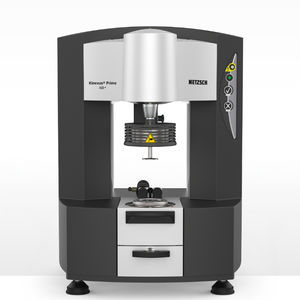
- Laboratory
- Physico-chemical analysis
- Rheometer for the food industry
- NETZSCH Analyzing & Testing
Capillary rheometer Rosand RH seriesfor the food industryfor the pharmaceutical industry

Add to favorites
Compare this product
Characteristics
- Technology
- capillary
- Applications
- for the food industry, for the pharmaceutical industry
Description
Used in hundreds of research laboratories around the world, the robust ‘H’ frame design of Rosand RH7 and RH10 floor standing capillary rheometers allows operation under ultra-high loading conditions, as well as providing optimized space for multiple accessory configurations.
Technical Data
Temperature range
Ambient to 400°C (standard)
Ambient to 500°C (high temperature option)
5°C to 300°C (low temperature cooling coil option)
Maximum speed
600mm/min
1200mm/min
Maximum drive force
50kN
100kN
Frame stiffness:
250kN
Dynamic range in speed:
200,000:1 (RH7); 400,000:1 (RH10)
Speed uncertainty:
<0.1%
Temperature control range:
<±0.1°C
Bore diameter:
15mm (standard). 9.5mm; 12mm; 19mm; 24mm (bore options)
Barrel bore length:
290mm
Barrel material:
Nitrided steel (standard). Hastelloy; Stainless Steel (barrel options)
Pressure transducer ranges:
30,000psi; 15,000psi; 10,000psi; 5,000psi; 3,000psi; 1,500psi; 1,000psi; 500psi; 250psi
Dies:
Tungsten carbide: precision ±5µm; Hastelloy (optional)
Die diameter:
0.5mm to 2mm (in 0.5mm increments) and 3mm as standard. (Other diameters, including fine bore dies, available to special order)
Atmospheric control:
Nitrogen purge for dry, inert test conditions (option)
FEATURES AND BENEFITS
Research-level Rosand RH7 and RH10 capillary rheometers provide highly flexible measurement capabilities for materials under high pressure and high shear rate extrusion - from polymer melts to ceramics, and from foodstuffs to inks and coatings.
High force range (up to 100kN) and wide dynamic speed range (up to 400,000:1) allow test correlation with real material processing conditions.
VIDEO
Catalogs
No catalogs are available for this product.
See all of NETZSCH Analyzing & Testing‘s catalogs*Prices are pre-tax. They exclude delivery charges and customs duties and do not include additional charges for installation or activation options. Prices are indicative only and may vary by country, with changes to the cost of raw materials and exchange rates.





